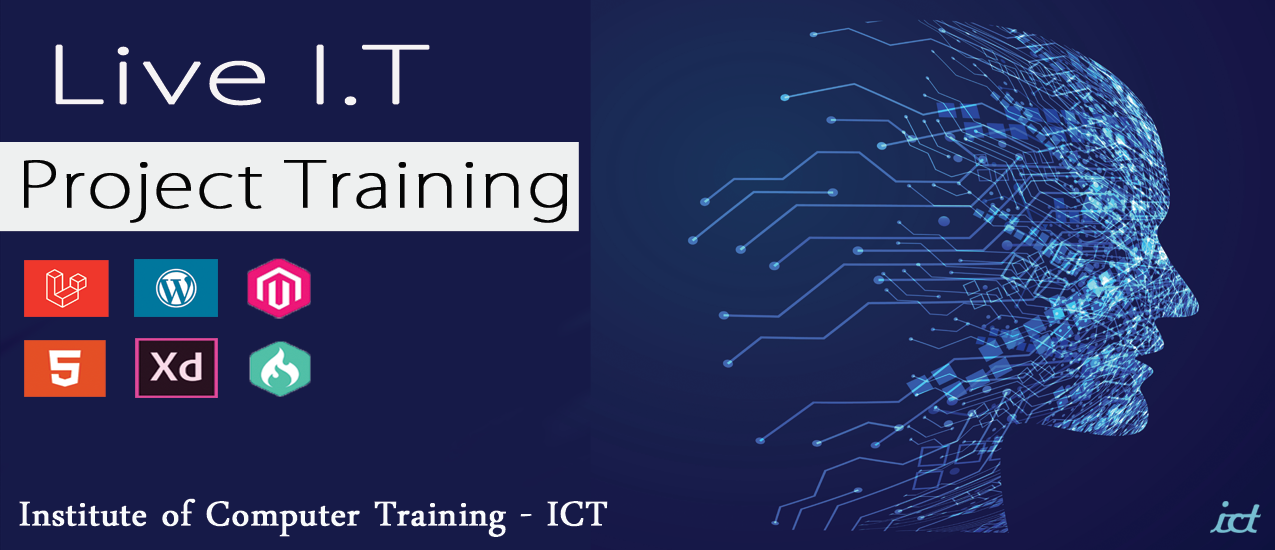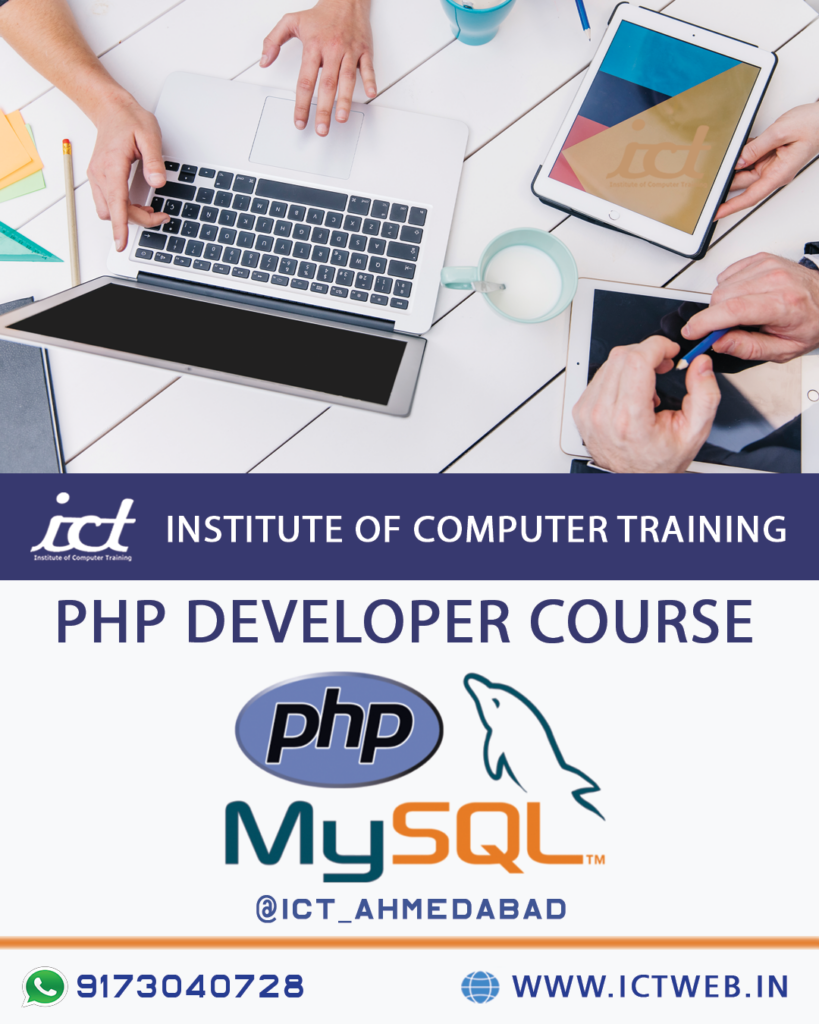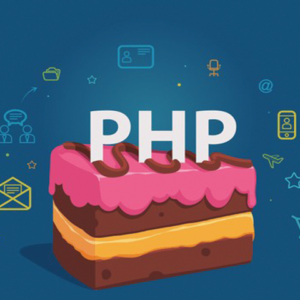The PHP Course Training in Ahmedabad at ICT is one of the leading PHP Training Institute. We cover all core and advanced PHP programming topics to necessary for creating Web applications. ICT’s PHP training program is a course where motto for teaching the beginner to make their career in the field of web development. Now a days in IT field, Highly demand of PHP Web Developer in Ahmedabad is increasing day by day. For fulfill that requirement, ICT provides Best Professional PHP Training which students get top achievement in industry.
ICT provide final year live IT project training center to the students of Computer – IT engineering, Diploma, Degree, BCA, MCA, BE, ICT ,BSc IT, MSc IT in Ahmedabad.
ICT gives to industrial live project experience for your best career development in IT field, After complete project training, ICT students are eligible to achieve IT JOBS in Ahmedabad.
ICT Training to student for give best in interviews preparation for fresher, Web developer, Back-end developer, Front-end developer, Full-stack developer, Mobile app developer.
Live Project
Soft Skill Development
Project Certification
Interview
Course Overview
– Overview of Web and Internet
– Difference between Languages and Scripts
– Client side and Server side Programming
– What is HTML?
– Versions of HTML
– Structure of HTML
– How html content is transferring data between browser and server
– Type of Webpages
– Introduction to Doctypes
Working with HTML
– Explanation about HTML, HEAD and BODY tags
– Input controls and attributes
– Form, Table tags
– How to provide Meta key words?
– What is Meta Description?
– Attributes
– Events
– Styling
Implement CSS – Cascading Style Sheet
– Introduction to CSS
– What is CSS?
– Types of CSS
– Advantages of CSS
– Types of selectors
– Font, font-family
– Font color, Size, Style
– Text, Letter-spacing
– Word-spacing
– Line-height
– Text-decoration, Transform
Work with Bootstrap Framework
Introduction to PHP
– Evaluation of PHP
– PHP Advantages
– Configure php.ini file
– Basic Syntax
– Defining variable and constant
– PHP Data type
– Operator and Expression
Decisions and loop in PHP
Function in PHP
String in PHP
Array in PHP
File management in PHP
State management – Cookies, Session in PHP
MySql Database with PHP
– Introduction about Database
– Overview of PHPMyAdmin
– Create Connection with MySql
– Work with database tables
– Introduce and implement DML command with query
– Create query with joins
– Working with advanced query
Implement PHP to HTML Form
– Introduce GET ,POST and Request
– Handling Form Data
– Work with Multi-value filed
– Work with Multi Forms
– Redirecting and retrieve data form after submission
Advanced PHP with OOP
– Overview OOP Concepts
– Work with Class & Objects in PHP
– Introduce new keyword and Constructor, Destructor
– Scope Access in PHP
– Working with properties and methods using reference variable
– Inheritance in PHP
– Polymorphism in PHP
– Interface in PHP
– Exception Handling with PHP
– Understanding Exception and error
– Working with Try, catch, throw keywords
Jquery and Ajax with PHP
– Introduction
– Syntax, Working with various selectors
– JQuery Events
– Jquery Effects (Hide, Show, Fade, Slide, Animate, Stop, Callback)
– Jquery HTML
– Get and Set Contents
– Add or remove content
– Jquery with CSS
– Jquery Traversing
– Traversing, Ancestors, Descendants
– Siblings, Filtering
– Jquery Misc
– Noconflict()
– Filters
Jquery with Ajax
– Jquery Load ()
– Jquery Get-Post
– CRUD
PHP Framework Introduction
Introduce GIT and other web developer tools
PHP Training Institute in Ahmedabad
PHP Developer Course in Ahmedabad
PHP Classes in Ahmedabad
Best Institute for PHP Training in Ahmedabad
Here’s a list of frequently asked questions (FAQ) related to PHP course training:
1. What is PHP?
PHP (Hypertext Preprocessor) is a widely-used, open-source scripting language primarily used for web development. It can be embedded into HTML to create dynamic web pages and is often used to manage content, databases, session tracking, and even build entire e-commerce websites.
2. Do I need any prior programming knowledge to learn PHP?
While prior programming knowledge is helpful, it is not mandatory. PHP is beginner-friendly, and training programs often start with the basics of programming, including variables, loops, conditionals, and functions, before diving into PHP-specific concepts.
3. What are the benefits of learning PHP?
- Widely Used: PHP powers over 78% of websites worldwide, including large platforms like WordPress, Facebook, and Wikipedia.
- Easy to Learn: PHP is known for its simplicity, making it suitable for beginners.
- High Demand: Many companies require PHP developers for web development projects, which increases job opportunities.
- Versatility: PHP is compatible with a variety of databases (such as MySQL) and supports multiple frameworks (like Laravel, Symfony, and CodeIgniter).
4. What will I learn in a PHP training course?
A typical PHP training course will cover:
- PHP Basics: Syntax, variables, data types, operators, and expressions.
- Control Structures: If-else statements, loops (for, while), and switch statements.
- Functions and Arrays: Creating functions, handling arrays, and using built-in functions.
- Forms and User Input: Collecting and processing form data, validating input.
- Databases: Integrating PHP with MySQL databases (CRUD operations).
- Sessions and Cookies: User authentication and session management.
- OOP (Object-Oriented Programming): Understanding classes, objects, inheritance, and polymorphism.
- PHP Frameworks: Working with popular PHP frameworks (e.g., Laravel, WordPress).
- Security: Preventing common vulnerabilities like SQL injection and XSS.
- Error Handling and Debugging: Tools for diagnosing and fixing issues in PHP code.
5. How long does it take to learn PHP?
The duration of PHP training depends on the course structure, your prior experience, and how much time you can dedicate. Typically:
- Beginner courses may take 6-8 weeks for full-time study or 2-3 months for part-time learners.
- Advanced courses might take 3-6 months, especially if you’re learning frameworks or combining it with database management.
6. Is PHP still relevant ?
Yes, PHP continues to be one of the most popular server-side languages for web development. Its robust ecosystem, frequent updates, and active community ensure it remains relevant for modern web development. Many legacy and new projects still rely on PHP.
7. What are the prerequisites for PHP training?
- Basic knowledge of HTML and CSS: Since PHP works alongside HTML for web page generation.
- Basic understanding of programming concepts: Though not strictly necessary, knowledge of basic logic, variables, and loops can be helpful.
- Basic database knowledge: Familiarity with concepts like tables, SQL, and relational databases will help when integrating PHP with databases.
8. Can PHP be used for building full-stack web applications?
Yes, PHP can be used in both front-end and back-end development, though it’s mainly used for back-end development. It integrates well with front-end technologies (like HTML, CSS, JavaScript) and can be paired with JavaScript libraries or frameworks (like React, Vue.js) to create full-stack applications. Popular frameworks like Laravel also offer tools to simplify full-stack development.
9. What tools are needed to learn PHP?
- Text Editor or IDE: Tools like Sublime Text, VS Code, or PhpStorm.
- Local Server: XAMPP, MAMP, or WAMP to run PHP and MySQL on your local machine.
- Browser: To view and test your PHP code.
- Version Control: Git or GitHub is highly recommended for source code management.
10. Are there any certifications provide for PHP?
Yes, ICT’s certification programs are available for up skill your career development.
11. What are PHP frameworks, and should I learn them?
PHP frameworks like Laravel, Symfony, and CodeIgniter provide a structured way to build robust web applications. They offer tools for routing, database handling, templating, and security, which speed up development. Learning a PHP framework is highly recommended for professional PHP developers. Other than we offer PHP CMS Framework WordPress Course Training Available.
12. What are some good resources for learning PHP?
- Online Courses: Platforms like ICT Skills offer structured PHP courses with one to one live training.
- Official PHP Documentation: The PHP manual (https://www.php.net/manual/en/) is an excellent resource.
- Books: “PHP and MySQL Web Development” by Luke Welling and Laura Thomson, or “Modern PHP” by Josh Lockhart.
- Online Communities: Stack Overflow, Reddit, and PHP forums are great places to ask questions and find solutions.
13. What are common mistakes to avoid while learning PHP?
- Ignoring security: Not using secure coding practices like prepared statements, escaping user inputs, and validating form data.
- Poor error handling: Failing to handle exceptions or errors properly.
- Not following best practices: Writing unreadable, unstructured code can make maintenance difficult.
- Avoiding Object-Oriented Programming: It’s a vital skill for larger projects, so avoiding it will limit your growth as a PHP developer.
14. What jobs can I get after completing PHP training?
- PHP Developer: Working with PHP to build dynamic websites or web applications.
- Web Developer: With PHP as part of a full-stack role.
- Back-End Developer: Using PHP for server-side logic and database management.
- WordPress Developer: PHP is integral to WordPress theme and plugin development.
- Freelance Web Developer: Offering PHP development services to clients.
This FAQ provides a comprehensive overview of PHP training and answers common questions that learners have.
- PHP is an acronym for “PHP: Hypertext Preprocessor”
- PHP is a widely-used, open source scripting language
- PHP scripts are executed on the server
- PHP is free to download and use
- PHP can generate dynamic page content
- PHP can create, open, read, write, delete, and close files on the server
- PHP can collect form data
- PHP can send and receive cookies
- PHP can add, delete, modify data in your database
- PHP can be used to control user-access
- PHP can encrypt data
With PHP you are not limited to output HTML. You can output images, PDF files, and even Flash movies. You can also output any text, such as XHTML and XML.
- PHP runs on various platforms (Windows, Linux, Unix, Mac OS X, etc.)
- PHP is compatible with almost all servers used today (Apache, IIS, etc.)
- PHP supports a wide range of databases
- PHP is free. Download it from the official PHP resource: www.php.net
- PHP is easy to learn and runs efficiently on the server side
More information about PHP Visit ICT.



